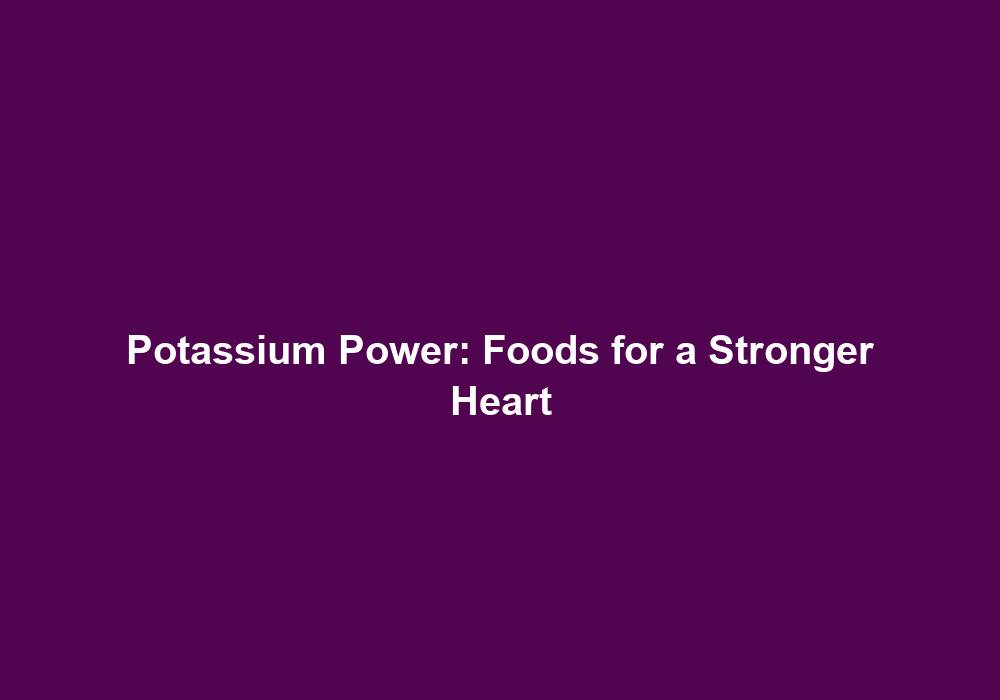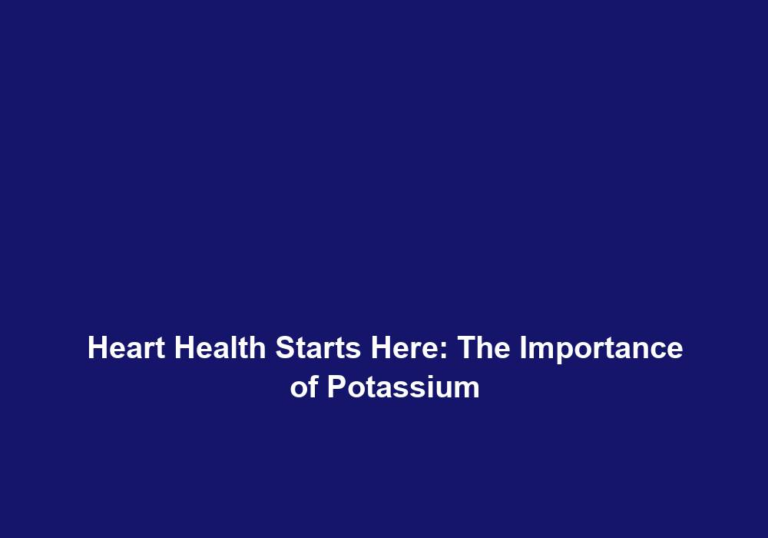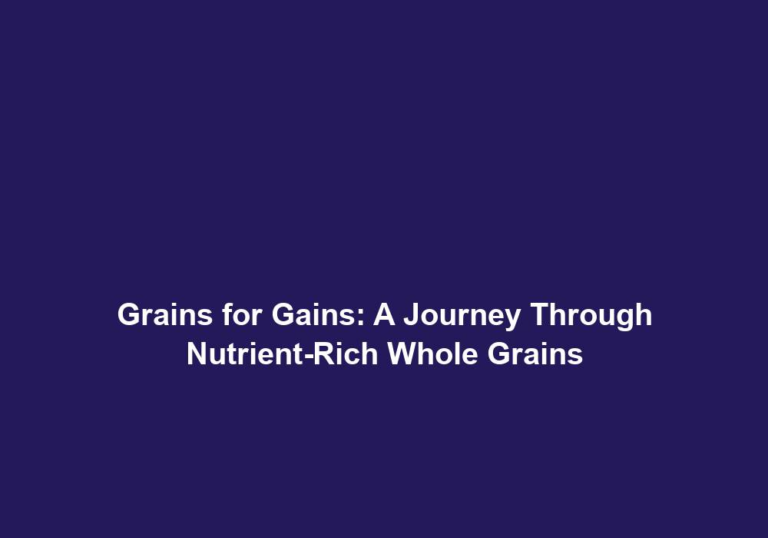Potassium Power: Foods for a Stronger Heart
When it comes to maintaining a healthy heart, nutrition plays a vital role. While there are numerous nutrients that contribute to cardiovascular health, one mineral that stands out is potassium. Potassium is an essential mineral that helps regulate blood pressure, balance electrolytes, and support proper heart function. Incorporating potassium-rich foods into your diet can significantly benefit your overall heart health. In this article, we will explore some of the top potassium-rich foods to help you strengthen your heart.
Why is Potassium Important for Heart Health?
Potassium, an electrolyte, plays a crucial role in regulating the balance of fluids in our bodies. This is particularly important for heart health because maintaining proper fluid balance is essential. Adequate potassium levels promote healthy blood pressure by counteracting the effects of sodium, which can raise blood pressure levels. Additionally, potassium plays a vital role in maintaining normal heart rhythm, as it aids in transmitting electrical impulses in the heart.
Potassium also supports the relaxation and contraction of the heart muscles, ensuring proper functioning of the heart. It helps prevent irregular heartbeats and reduces the risk of arrhythmias. By maintaining the balance of electrolytes, potassium helps optimize the overall cardiovascular system.
Top Potassium-Rich Foods for a Strong Heart
-
Bananas: Bananas are a classic and easily accessible source of potassium. With approximately 400-450 mg of potassium per medium-sized banana, incorporating this fruit into your diet is a tasty way to boost your heart health.
- Bananas are not only rich in potassium, but they are also a great source of dietary fiber, vitamin C, and vitamin B6.
- Consuming bananas can help lower blood pressure levels, reduce the risk of stroke, and support heart health.
-
Leafy Greens: Dark, leafy greens such as spinach and kale are not only rich in vitamins and minerals but also pack a punch when it comes to potassium content. Aim to include these nutrient powerhouses in your meals to increase your potassium intake.
- Spinach and kale are excellent sources of potassium, providing around 300-400 mg per cooked cup.
- These greens are also loaded with antioxidants, fiber, and other heart-healthy nutrients like folate and magnesium.
-
Sweet Potatoes: In addition to their delicious taste, sweet potatoes are an excellent source of potassium. One medium-sized sweet potato contains about 500 mg of potassium, making it a heart-healthy choice.
- Sweet potatoes are also rich in fiber, vitamins A and C, and antioxidants.
- The combination of potassium and other nutrients in sweet potatoes can help lower blood pressure and reduce the risk of heart disease.
-
Avocados: Avocados are not only a trendy food but also a great source of heart-healthy fats and potassium. They provide around 900 mg of potassium per avocado, making them an excellent choice for those looking to boost their potassium intake.
- Avocados are packed with monounsaturated fats, which can help lower bad cholesterol levels and reduce the risk of heart disease.
- The high potassium content in avocados supports healthy blood pressure levels and overall heart function.
-
Oranges: Oranges not only provide a refreshing burst of flavor but are also rich in potassium. Enjoying a medium-sized orange can provide you with approximately 240 mg of potassium.
- Oranges are also an excellent source of vitamin C, fiber, and antioxidants.
- Consuming oranges may help lower blood pressure, reduce inflammation, and improve overall heart health.
-
Tomatoes: Tomatoes, whether eaten fresh or in the form of sauces or soups, are a fantastic source of potassium. One medium-sized tomato contains around 290 mg of potassium, making it a heart-friendly addition to your meals.
- Tomatoes are also rich in lycopene, an antioxidant that has been associated with a reduced risk of heart disease.
- The potassium and other nutrients in tomatoes contribute to maintaining healthy blood pressure levels and supporting heart health.
-
Yogurt: Not only is yogurt a delicious and versatile food, but it also offers a significant amount of potassium. Opt for plain, low-fat yogurt to avoid added sugars and enjoy the benefits of its potassium content.
- Yogurt is a good source of protein, calcium, and probiotics, which promote gut health.
- The potassium in yogurt helps regulate blood pressure and supports heart health.
Other Factors to Consider for Heart Health
While incorporating potassium-rich foods into your diet is beneficial, it’s essential to consider other factors that contribute to heart health. Here are some additional tips to keep your heart strong:
Reduce Sodium Intake
While potassium helps regulate blood pressure, it is equally important to reduce sodium intake. High sodium levels can counteract the positive effects of potassium on blood pressure. Aim to limit your sodium consumption by avoiding processed foods, using herbs and spices instead of salt for flavoring, and reading food labels for sodium content.
- Processed foods, such as canned soups, frozen meals, and snack foods, tend to be high in sodium. Opt for fresh, whole foods whenever possible.
- Experiment with different herbs and spices to add flavor to your meals without relying on salt.
- Reading food labels can help you make informed choices and select low-sodium options.
Maintain a Balanced Diet
Incorporate a variety of nutrient-dense foods into your diet, such as lean proteins, whole grains, fruits, vegetables, and healthy fats. A balanced diet ensures you receive all the essential nutrients, vitamins, and minerals required for optimal heart health.
- Lean proteins, such as poultry, fish, and legumes, provide essential amino acids without excess saturated fats.
- Whole grains, like quinoa, brown rice, and whole wheat bread, are rich in fiber and can help lower cholesterol levels.
- Fruits and vegetables offer a wide range of antioxidants, vitamins, and minerals that support overall heart health.
- Healthy fats, found in foods like nuts, seeds, avocados, and olive oil, can help lower bad cholesterol levels and reduce the risk of heart disease.
Engage in Regular Physical Activity
Regular exercise is crucial for maintaining a strong heart. Aim for at least 150 minutes of moderate-intensity aerobic exercise or 75 minutes of vigorous exercise per week. Consult with your healthcare provider to determine the appropriate exercise regimen for your individual needs.
- Aerobic exercises, such as brisk walking, cycling, swimming, or dancing, can improve cardiovascular health and strengthen the heart.
- Strength training exercises, like lifting weights or using resistance bands, help build muscle and support overall heart function.
- Finding activities you enjoy can make it easier to stick to a regular exercise routine.
Control Stress Levels
Chronic stress can have a negative impact on heart health. Finding healthy ways to manage stress, such as through meditation, yoga, or engaging in hobbies, can significantly benefit your overall well-being.
- Meditation and deep breathing exercises can help reduce stress and promote relaxation.
- Yoga combines physical movement with mindfulness, providing a holistic approach to stress management.
- Engaging in hobbies or activities you enjoy can provide a sense of fulfillment and help relieve stress.
Limit Alcohol Consumption
Excessive alcohol consumption can increase blood pressure and contribute to heart disease. It is recommended to limit alcohol intake to moderate levels, which means up to one drink per day for women and up to two drinks per day for men.
- Moderate alcohol consumption has been associated with a lower risk of heart disease compared to excessive or no alcohol consumption.
- It’s important to be mindful of serving sizes and choose lower-alcohol options when enjoying a drink.
- If you have a history of alcohol-related problems or certain medical conditions, it’s best to avoid alcohol altogether.
Conclusion
Incorporating potassium-rich foods into your diet is a fantastic way to support a stronger heart. From bananas to leafy greens, avocados to sweet potatoes, there are plenty of delicious options to choose from. Remember to combine a balanced diet with other heart-healthy practices, such as reducing sodium intake, engaging in regular physical activity, managing stress levels, and limiting alcohol consumption. By taking these steps, you can nourish your heart and promote overall cardiovascular health.







